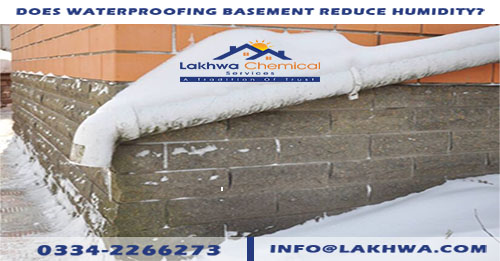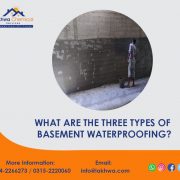Does waterproofing Basement Reduce Humidity?
Waterproofing Reduce Humidity : High humidity levels result from excess moisture in the basement. This problem can occur due to improper drainage system or insufficient ventilation. Air, water runoff, and other factors can infuse a humid environment that can lead to various issues, such as mold growth, musty odors, and damage to stored items.
In this article, we will explore the relationship between basement waterproofing and humidity, examining its potential benefits and limitations.
Understanding Humidity in Basements
Basement humidity occurs through foundation walls and floors. Perspiring conditions can emerge if the materials are porous in nature. Addressing the root cause of moisture intrusion is crucial in controlling basement humidity. The level of humidity varies between 50% in summer and 30% in winter. Extreme levels can cause adverse skin conditions, peeling of wall paint, breathing problems, and more.
Read More
Benefits of New Construction Foundation Waterproofing in Pakistan
Does Waterproofing Increases Basement Construction Cost in Pakistan?
Challenges of a Successful Expansion Joint Treatment
The Role of Basement Waterproofing
Basement waterproofing refers to different techniques aimed at preventing water infiltration into the basement. Preventive methods, such as sealing cracks, applying waterproof coatings or membranes, installing drainage systems, and improving grading around the foundation are advised by experts.
By eliminating or reducing moisture intrusion, basement waterproofing can help mitigate humidity-based issues. It is essential to note that the process is effective and beneficial due to various factors, such as proper ventilation and limited moisture sources in the basement.
Benefits of Waterproofing
Basement waterproofing offers several benefits in reducing humidity. Firstly, it creates a barrier against water penetration, minimizing the potential for moisture seepage through foundation walls and floors. This, in turn, reduces the moisture content in the basement, leading to a decrease in humidity levels. Additionally, waterproofing measures, such as installation of drainage systems can redirect water away from the foundation, preventing it from accumulating and adding to the overall humidity. As a result, homeowners may experience a more comfortable environment, with reduced risks of mold growth and contaminants.
Read More
Signs to Identify that Your Basement Needs Repairing
Major Causes of Leakage within the Basement in Karachi
What are the Three Types of Basement Waterproofing?
Limitations & Considerations
While basement waterproofing is an effective strategy to reduce humidity, it is essential to consider the limitations. For instance, waterproofing does not address internal moisture sources, such as leaky plumbing or improper ventilation. These factors can contribute to humidity levels and must be resolved separately. Additionally, if waterproofing is not done correctly or fails over time, it may not provide the desired results. Regular maintenance and inspection of the waterproofing system is crucial to ensure its effectiveness. In cases of severe groundwater intrusion or excessive moisture problems, additional measures, such as dehumidification or sump pump installation may be necessary.
To control humidity levels, follow the pointers mentioned below:
- Fix leaks and seepage
- Ventilate the crawlspaces
- Use exhaust fans
- Turn off appliances (humidifiers and kerosene heaters)
- Raise the temperature of surfaces where condensation occurs.
- Use a vapor barrier when installing a carpet on concrete floors
Outdoor Recommended Temperature & Relative Humidity
| Temperature | Humidity |
| +20oF | 35% |
| +10oF | 30% |
| 0oF | 25% |
| -10oF | 20% |
| -20oF | 15% |
How Can I Tell If My Home is Too Humid?
Use a hygrometer to find out the level of humidity in your premises. Purchase one from local or online stores. To check humidity, read the numbers being shown on the screen. Ideally, indoor humidity levels lie between 40-60%. In this range, problems, such as respiratory illnesses would reduce significantly.
Conclusion
Basement waterproofing is an effective approach to reduce humidity levels and combat the issues caused by water ingress. By addressing the water seepage sources, proper basement waterproofing can help create a drier environment, minimizing the risks of mold growth and musty odors. However, it is important to understand that waterproofing may not eliminate humidity-related issues if internal moisture sources are plentiful and unattended.
Reducing moisture from your premises or offices is mandatory for a healthy and amiable atmosphere. Contact Lakhwa Chemical Services and book your appointment today.





Leave a Reply
Want to join the discussion?Feel free to contribute!